
While Devin’s official review of Batman Begins arrives next week, we wanted to voice our opinions on the film, as there’s been some incredible hyperbole out there on the web clouding what might be a really unique theater experience for some of you out there. I really liked the film, so did Micah, but we had our issues. Russ and Devin found a little more lacking. What follows is our tag team discussion (anyone remember our old "It Said, It Said" columns?) on the flick. Enjoy!
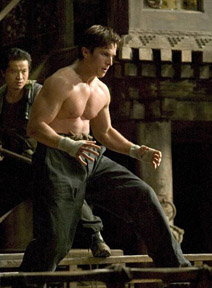 Micah Robinson:
Micah Robinson:
It’s the pinnacle of the summer. It’s certainly what the movie industry,
currently in a slump, is pinning a lot of hopes on. And how it well it’s
received is going to shape future comic adaptations due to its somewhat novel
approach. While I wish to God I was talking about the DVD release of Brett
Leonard’s Man-Thing, that’s not the case. This is all about the Dark
Knight Detective, Batman. Fortunately, with a core demographic like CHUD’s, we
don’t have to waste precious space giving background on this film. You’ve done
the research yourself. The film’s not far away and you want to know how good it
is. That’s easy. It’s pretty damn good. Better than you could expect from the
script. Exactly as good as you would expect from the director and cast
involved. How well you take it depends on how well you can excuse the problems
of the film, which – for me – stem entirely from David Goyer and some
mind-numbingly boneheaded plot and character bits that somehow made it past
Chris Nolan and the rest of the minders at Warners. Before we get to that,
however, let’s talk about what they got oh so right.
Russ Fischer:
Bats has never had a proper origin story told on film. Goyer and Nolan go at it
almost recklessly, inventing some new details and cherry picking from several
versions of the story, with a heavy reliance on Year One. Their infatuation for the origin arguably overwhelms the
second half of the film, but it also makes the first half fantastic. Wayne, Sr.
is a fantasy father figure, an idealist who would have raised young Bruce Wayne
to become a philanthropic paladin. With his death, Bruce is left in a state
where he’s ruled by childhood fears and visions of revenge.
To pull Bruce out of that state, Goyer chooses an excellent
go-to guy: Ra’s Al Ghul, a sort of ancient crusader whose passion for justice
is untainted by any blush of compassion. Weaving Ra’s into Bruce’s martial
training is an inspired choice. Through his organization, the foolishly named
League of Shadows, Bruce learns everything an aspiring crime fighter needs to
know. And in response to Ra’s bleak view of the social contract, Bruce develops
the cornerstone of his approach to crime. Naysayers have labeled Batman a
fascist ever since Frank Miller penned The
Dark Knight Returns, and this account is an elegant rejoinder.
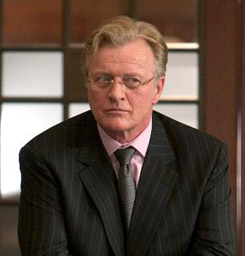 Devin Faraci: It
Devin Faraci: It
looks like I’m going to be the lone dissenting voice on Batman Begins.
But I have to be honest, and part of that honesty is saying that I don’t know
if I have ever seen a film drop the ball in such a shattering way. The movie
begins wonderfully – Christopher Nolan has crafted a drama about people who
just happen to be ninjas and vigilantes. Sure, David Goyer has stuffed
everyone’s mouths with awful, stilted dialogue (especially Liam Neeson, who
comes across like Mystery Men’s The Sphinx on occasion), but
these are some great actors, and they work their way around the dead spots.
But as Bruce Wayne becomes Batman, and as the plots and
plans of the villains become clear, the movie slowly moves away from being an
engaging film about people and starts to fit itself into the mold of every
other dumb action movie you’ve ever seen, with but directed by a guy who just
can’t do action. And by the third act Batman Begins had squandered
all the goodwill it had built for me, leaving me alternately snickering and
groaning at what I was sitting through.
Nick Nunziata:
See, I think that they’ve taken age old and tested bits of mythology from
Batman and other sources and crafted a really rich backdrop for the character.
It’s a lot easier to nail a character when you have the benefit of dozens and
dozens of issues or a series of animated adventures, but in film where
everything is about getting to the action and pleasing people who are weaned
not only on the old Batman movies (of which only Batman Returns is really
all that interesting) but on the current crop of superhero flicks. This to me
seems very much inspired by aspects of both the Spider-Man and X-Men film
franchises beginning with the new DC animation that precedes the film (as much
like the Marvel intro and the Emilio to Marvel’s Charlie) and leading up to the
classy period aspects of the early moments right up to the “power and
responsibility” lesson at the end of the film. What makes this effort special
to me is how it’s a movie first and a summer movie second. The third act is
extremely clunky, but I felt that the film had done so much stuff well leading
up to that point that it was too late to be a deal breaker. I’ve always felt that
it’s more important to be a good Bruce Wayne than a good Batman, because one
informs the other and the contrast between the two hasn’t ever been portrayed
this well. Bale is a great actor and seeing him go from lost rogue to confused
son to driven billionare to a conflicted hero having to fake being Bruce Wayne
when all he wants to do is be Batman is a blast. Sure, his voice comes off a
little forced in costume but I appreciate the effort to at least try to mask
the identity of Batman instead of asking an audience to slip into the
believability vacuum they’re in with Superman. This is totally about character
and I’d honestly have been fine if they didn’t even try to have an action
climax. There’s nothing that the Scarecrow and Ra’s Al Ghul can do that’s more
interesting than Batman and Bruce Wayne. This film nails the character stuff
really well, especially when considering that this is a big budget franchise
picture based on a comic book. It ain’t classic drama, but for this kind of
film it approaches cutting edge genius at times.
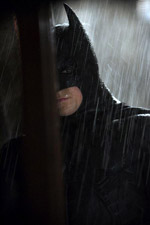 Micah Robinson: On
Micah Robinson: On
the positives, we’re mostly agreed, so let’s get into the “third act” that we
all have problems with to varying degrees. Without spoiling too much, I can say
that the third act of the film involves Batman and Gordon working together to
try and stop the central “evil” plot of the film. I actually noticed that the
trouble with this plot started much earlier in the film because it really
starts in the scene when Bruce has to leave the League of Shadows, who exist
thousands of miles away. So, thanks to Goyer’s spotty screenwriting, he takes
the newly expanded world where
and shrinks it by at least half. Then, to kick off the third act, he shrinks it
even further by having one of those prolonged, exposition-heavy conversations
that villains always give to illuminate the hero (and the audience) on why such
a dastardly scheme would take place. Not only does this (along with the last
League of Shadows scene) make no sense whatsoever, but it shrinks the world of
the Batman even further. To top it all off, the film’s final, prolonged action
sequence is an unholy combination of the supremely dumb
Gentlemen and the end space battle of The Phantom Menace, with
Jim Gordon playing the Jake Lloyd role. I really couldn’t have been more
disappointed with the film’s conclusion if Oldman had jumped up after it was
all over, looked into the camera as the score came to a halt, and exclaimed
“Now, this is podracing!” followed by a snare roll and cymbal crash. It’s THAT
silly.
Russ Fischer: It’s
true — that ‘troubled’ third act is a mess that really waters down the final
impact. There’s a car chase, which is both boring and totally out of character
for the Batman the film has established. Jim Gordon essentially becomes a very
lame old Robin, which is a sad fate for the first dignified performance Gary
Oldman has delivered a genre film in over a decade. And while I think that the
Scarecrow is very well realized when he’s acting on his own, his place in the
final ‘grand evil scheme’ just doesn’t hold water.
The real issue is that Batman Begins is essentially two
films: an extended and very well-conceived origin story, followed by a stunted
action finale. The chief loser is Ra’s Al Ghul, who nearly gets lost in the
shuffle. What could have been a big, powerful presence in this cinematic post-Crisis (that’s what we call Schumacher)
rebirth becomes just another overblown ego, taken down by the same lessons he
endlessly drilled into his students.
In defense of Nolan’s facility (or lack thereof) with
action, I think it’s important to keep in mind that he’s doing his best to
shoot around the batsuit, so that we don’t have to see Bale lumbering around
like an oaf. For that, I thank him. So what you don’t see here is a foolish
rubber superhero. Instead, Batman works in the shadows, fighting half the
battle with his presence and theatrics alone, which is perfect.
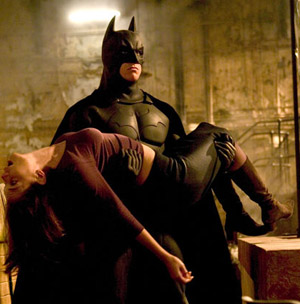 Devin Faraci: Spider-Man and the X-Men managed to
Devin Faraci: Spider-Man and the X-Men managed to
have suits that gave them agility. Why not Batman? The limitations of the suit
reflect back on the director. But even still, his problems with action don’t
begin when
dons the Batsuit. They start right at the beginning. The first few fight scenes
have Bruce Wayne in combat with people dressed just like him – mix that with
the quick edits and tight close-ups Nolan uses here and you have a fairly big
mess. What’s funny is that in the film’s first fight scene, right at the
opening,
is taking on a number of Asian (perhaps Tibetan?) foes in a prison. They’re all
wearing prison outfits, but at least you can tell the white guy apart from his
enemies. Except that as soon as the fight begins Nolan throws them all in the
mud.
Another third act problem that begins much earlier is the
love story. Why do these movies keep throwing in love stories? Five Batman
films in my lifetime, five shitty love stories – I’m frankly mystified. I don’t
know if this is the weakest of all the Batromances, but it’s up there, thanks
to Katie Holmes’ stunning lack of charisma. And it’s even worse because of the
way Batman himself deals with it. I don’t want to spoil it or anything, but it
seems like in Nolan’s world Bruce Wayne has some Weezer and Bright Eyes playing
in the Batmobile.
Thankfully Holmes is the only really weak acting link. This
film is blessed with such a great cast, but I do want to take a moment to
single out Tom Wilkinson, who plays mob boss Carmine Falcone with just the
right mix of 40s tough and 80s slimeball. I loved him every minute onscreen.
Nick Nunziata:
Wilkinson was great and he did a good job of portraying the aloof yet
snake-like menace of Falcone. Special credit has to go to Linus Roache in
turning Daddy Wayne into more than a faceless motivator. Regarding the batsuit,
I think part of the problem is that you simply cannot mess with it. Like
Spider-Man. It has to remain as true to the comic as humanly possible, except
that the batsuit doesn’t lend itself to dexterity in the real world. As for
making it work in motion, the first sequence where Batman attacks the thugs at
the harbor is a perfect example of the way the character ought to be realized.
Quick ghost-like attacks from the darkness by the hero followed by
disappearance. There are certain aspects of this film that are shot like a
horror flick, from the really dark and surprisingly spooky Scarecrow
hallucinations to Batman’s attacks on crooks. It’s a different look at the
character but it works. Also, by having Lucius Fox and his toy chest provide
the arsenal allows for some of the disbelief to be suspended in how such a high
profile entity could live in anonymity. They did a lot of stuff to make this
film intelligent that the sillier things seem insignificant. The thing about
the other Batman films is that the villains were focal. Here, they’re
extraneous. It’s as if Goyer and Nolan knew they needed villains but were much
more interested in Batman. I wish audiences could tolerate a film like this
without set pieces and villains because it’s an obvious weakness of the film.
That said, as a Batman flick it’s amazing. I don’t why they felt the need to
involve Gordon in the climax and agree that Holmes wasn’t convincing, but does
it matter? What would they have had to sacrifice to make the villains as good
as Magneto, The Green Goblin, or Dr. Octopus were in their films? If it meant
shortening any of the Bruce Wayne/Batman stuff I think they erred on the side
of logic.
 Russ Fischer: The
Russ Fischer: The
only issue I have with the love story is the extent to which it drives Batman’s
actions in the last act. But I think Rachel’s input in the opening and middle
of the film is essential. With Alfred, she’s Bruce’s surrogate family and
conscience, and she has a huge and positive impact on the story, right up until
the point where Goyer runs out of ideas to motivate Batman and decides to use
her as a crutch.
And even when those problems do crop up, I think they’re
offset by a tremendously strong showing from Christian Bale, Liam Neeson and
Tom Wilkenson, not to mention the good work of Gary Oldman and Cillian Murphy,
both of whom lose out due to lack of time and attention to detail.
Bale is believable from beginning to end, even when Goyer’s
script puts some really awful lines in his mouth. This is a vision of Batman I
can fully sink my teeth into, in comparison to
mentioned that the character needs a strong Bruce Wayne, and Bale provides
that. He’s defined by fear and anger, and overcompensates with discipline and
martial prowess. The scenes where the young billionaire realizes that he has to
play at being Bruce Wayne are among the best the character has ever been
granted onscreen. Even when the film lurches too close to
a motivator, it’s still heading in the right direction.
There are things I’d like to see that are M.I.A. — notable
among them being the hero’s detective skills — but this is a fully realized
vision of Batman. It may not be the one long time readers of the comics expect
or dream of. But with the exception of that absurd and totally out of character
car chase, it’s consistent and very well-balanced.
Micah Robinson:
And despite Goyer’s screw-ups, it gave me a lot of confidence in this creative
team and set of actors making better Bat-films in the future. They’ve already
established Bruce Wayne/Batman as much as they need to, so it’s only logical
that future installments would give us better-written and better-motivated
villains facing a more assured Batman (along with a more seasoned Bale). It’s
just a shame that they wasted Ra’s in this installment. If he were better
written, he could be the villainous spectre of this series much like Willem
Dafoe’s Goblin is the Spider-Man films or McKellen’s Magneto is to the X-Men
franchise. But the film ends on a note leading to an even more infamous and
arch-villain of Batman, and it appears that he’ll take that spot. I can see the
wheels turning for him turning Rachel into Oracle as he did Barbara Gordon in
the comics, thereby giving Wayne/Batman a powerful new revenge motif in the
next film. And that’s something I can definitely look forward to.
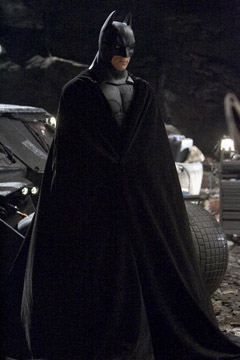 Before I look too much into the future, tho, I have to
Before I look too much into the future, tho, I have to
object, Russ, that the third act begins with the “boring” car chase, which is
actually quite exhilarating in a surround sound theater with the sound cranked
up. It’s more than just audio overkill, too. There’s a real punch to seeing
that thing rocket through the streets of Gotham evading the police with
tricks. It’s not out of tone or character with the film because it’s driven by
Bruce’s desperation to save Rachel from the effects of the Scarecrow gas. More
importantly, it’s the only action scene, aside from perhaps the Ducard/Wayne
training sequences, that has any discernable logic to it. The hand-to-hand
fight scenes, as has already been noted, have been chopped to incoherent shit.
I don’t care whether it’s to hide the suit in motion or not. If Batman is
kicking ass, I want to see it. I don’t see why Keanu Reeves can credibly fight
off a lot of guys in a black floor length gown without quick cuts, and yet
Batman cannot. By all means, let’s have more gadget/vehicle/weapon combat, and
stave off the hand-to-hand stuff, which just isn’t Nolan’s forte. He’d be
better served handing off the fight scenes to an HK fight choregrapher/director
to handle. There’s no sense in sending your actors through so much training
only to not have much evidence of it appear onscreen.
Devin Faraci: The problem with the car chase is a good
indicator of why the film ended up not working for me. If Rachel has a lethal
dose of Scarecrow’s fear gas do you think the best place for her acid-tripping
self is in a car going 200 miles an hour, smashing through every single
obstacle available in its path (it seems like Batman goes out of his way to
break stuff) while the guy with the terrifying Batsuit on is SCREAMING at her?
This is dumb action movie behavior, not Batman behavior. Gordon could have
gotten her to where she needed to be quickly with a police escort. And I don’t
care how “Year One” this is – Batman is not shown as an incompetent in the
film.
Sadly he’s not shown as competent either. He’s a hero who reacts, reacts and
reacts some more. He doesn’t crack the case in the film, it’s handed to him.
The dots are connected elsewhere and he just runs around hitting people. And
having Coca-Cola commercial moments with obnoxious, unneeded kids. The Batman
in this movie isn’t the one I know, the smartest guy in the room, the guy with
a thousand plans in place, the guy with an encyclopedic knowledge of pretty
much everything. This Batman is a couple of notches below Daredevil and a few
above the Punisher.
I wish I could get
on board with you guys here, but as every frame of the third act unraveled the
good stuff that came before (and the good stuff was so very, very good), I
slumped in my chair and got sadder and sadder. Ironically this stuff wouldn’t
have bothered me half as much if the first hour of the film hadn’t been so
completely great. But from the nonsense of the final bad guy plan to the cheap
cheesiness of the smoke filled alleys at the end (the “riot” scenes look like
they have ten people in them) to the tragic undervisualization of the Scarecrow
fear gas effect (has there been something more squandered in the CGI era than
this?) to a final battle that wouldn’t have been out of place in a “blow it to
shit” Die Hard rip-off, Batman Begins ends
on a bad, bad note.
Nick Nunziata:
I don’t know. I just think it’s good to see an analog movie like this. I hate
the rooftop car sequence. I hated it in the script. Cars on rooftops don’t seem
like something I want to see, and I’m surprised they shot it. Nolan’s too smart
for junk like that. I have to go back and say that I really like the quick
attacks by Batman, though. He’s quick and he’s scary. Most of the fight scenes
in the previous bat-films have been stiff and boring and we get our amazing
fight choreography from other films. The action in these films is almost
unnecessary, like in a Buffy episode.
What matters is character, character, character. Nolan gets it, and the first
half of Goyer’s script is very acute and has moments where it feels like a real
drama and not a summer movie. Of course, there are those moments whose success
is totally dependent on the line delivery of the individual actor delivering
them which is why you have people like Michael Caine, Liam Neeson, and Morgan
Freeman in the movie. There’s a really solid foundation here and I loved the
way the Scarecrow fear effects were handled. It was simple, but effective. The
usage of the villain characters save for Falcone is a huge mistake and while I
don’t have an affinity for Ra’s Al Ghul like you guys do, I’ve never liked
Batman villains to begin with. They’re all just things to keep the “A” character
occupied. I’d be content with a Batman film series dealing with the Dark Knight
taking on more Machiavellian enemies. The Long Halloween’s a great example of
how plot and subtlety reigns over theatrics and set pieces. I hope this is a
connector of a film, something that lives on both worlds. It gets a lot wrong,
but in my eyes they got the right stuff wrong. If they’d had stunning action
moments and villains whose motives and actions were the
again and then where would we be? This is a flawed film but they got the right
stuff right.
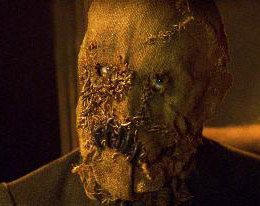 Micah Robinson: Dev, I just don’t think the film can win with you because you demand to
Micah Robinson: Dev, I just don’t think the film can win with you because you demand to
see “the Batman you know,” and yet you go in fully knowing that this is an
origin story, and what would’ve been cheesier than Bruce leaving
watching him put the outfit and gadgets to use for the VERY FIRST TIME. He’s
still getting his methodology straight. There’s no Bat-computer. No Bat-jet. No
Robin. He has no relationship with Gotham City Police. He’s not seasoned. So,
he SHOULDN’T be the Batman you know. Granted, he could’ve been more proactive
in solving this particular case, but there should be room for growth in future
films. This is – literally – the very beginnings of Batman. He shouldn’t be
incompetent, as he has a good bit of ninja training and his natural instincts.
But he shouldn’t be the “be all, end all” either. There’s nothing wrong with
him interacting with a child for all of 30 seconds. He should only want to
intimidate criminals.
As for the car
chase, there’s nothing dumb about it. Only he has the antidote, and it’s in the
Bat-cave. Handing her to Gordon and a police escort would make no sense as they
don’t know where the cave is and he would compromise his identity by showing
them the way. He also doesn’t know how much time she has to live. The police
have already decided he’s a vigilante threat, and they have the building
surrounded. It’s a frantic situation and there’s only one immediate solution.
He takes it. It would be a “dumb” action piece if Nolan and Goyer hadn’t set it
up so that it was his only viable option. Obviously, he goes overboard during
the chase, and Alfred rightfully takes him to task afterward. How is any of
that dumb or typical? I agree that Batman
Begins ends on a bad note – a horrible one, in fact. But does it taint
the character or sabotage future films? No. I’m not denying that this film has
problems, but they’re not dealbreakers or world enders. For what this film is
meant to do – re-define Batman and
think it gets the job done. The lameness of Ra’s and his plot is unfortunate,
and it does hold the film back somewhat, but it’s a minor part of the film.
They get Batman right. They get Bruce Wayne right. They get the Scarecrow
right. They get
right. They get Alfred right. So much is done so well that it seems unfair to
sink the film based on the chief villain.
Russ Fischer:
I stand firm on the car chase, because even as one of a few big action scenes
it’s woefully out of place. Though I like the foggy, BBC feel of the chaos in
the Narrows, I’d say cut the chase and spend that money creating an even better
and more evocative sequence once the Scarecrow’s gas takes effect. The script
lays it out perfectly — the whole point is for this character to become a
symbol, so that his reputation does half the fighting. I’m with Nick on the
Carmine Falcone dock sequence, because that sort of horror movie shadow
fighting is exactly what this character needs. Wouldn’t it be great if, once
Batman goes into action, we were sometimes as scared of him as the criminals?
My affinity for that
approach is why I like the Scarecrow, once he goes into action. Batman Begins gets much of the
character very right, even though it denies him a real movitation. The mask is
great — very home made — and the effects are minimal, but the effect is
perfect. He really should have an entire movie to play with. Ra’s could be
perfect as the Machiavellian enemy Nick wants to see, and is essential to this
origin, but the Scarecrow is a great and very underappreciated part of the
Batman world.
That leads into my
final note, which is that, in part, I ended up liking this film because it
understands the relationships of these characters, even when it doesn’t get all
the mechanics right. Unlike Nick, I think the Batman bestiary is among the best
in the genre, simply because it’s very balanced, which offers a lot of thematic
opportunities that go beyond basic action movie material. Goyer and Nolan know
this, and even with the over-emphasis on fear, they don’t feel the need to rub
the audience’s face in it. And one very nice touch is that by the end Gordon
understands same thing.
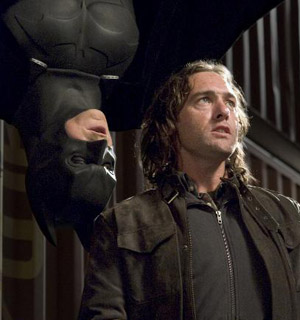 Devin Faraci: I hate to get into plot mechanics
Devin Faraci: I hate to get into plot mechanics
arguments, but I will say that Batman has a way of getting in touch with
Alfred. We saw it in the film. All he had to do was have Alfred take the
antidote someplace and meet Gordon and Rachel. Presto solvo.
As for the “newness”
of Batman – Frank Miller’s Batman: Year One does what this movie should have
done (and what all movies should do), it showed us Batman as a newbie. He
screws up his first fight. Here Batman goes out once and takes out a huge chunk
of
this Batman is at all different from one who has been operating for a couple of
years. I didn’t feel like Batman learned or grew as a hero in the film; it felt
like a pilot for a Batman series – let’s introduce elements so that we can have
them later, as opposed to organically growing them. If Batman in this movie had
a learning curve I would wholly agree with you. But he doesn’t.
I know I am being
hard on the film, but when a film has this kind of pedigree, I expect more.
It’s not an incompetent film, it’s not an incoherent film, it’s not a boring
film, it’s not even an egregiously stupid film (oh but it does flirt with that
last one). It’s just a disappointing film. Where you guys seem to see this
setting up better films in the future, I prefer to judge the film on what it is
now, which is something that doesn’t equal the sum of its parts.
Nick Nunziata:
I agree. It’s not a perfect movie. It is my favorite Batman flick and that includes
The Mask of the Phantasm. Warner
Bros. experiment to make a comic book movie with all above-the-line talent was
a success, last act notwithstanding. For the first hour of its running time,
Batman Begins is a terrific movie. Not just a good comic book flick, but an
honestly terrific film. It peters out eventually but the end result isn’t a
classic but something that sets the ship right and sends it extremely
seaworthy.